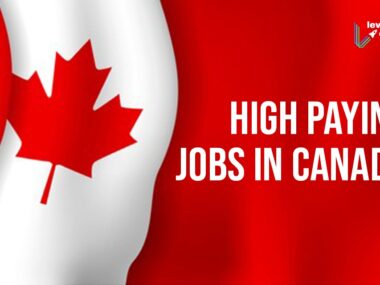Canada’s Highest Paying Jobs and the Best Universities for Getting Hired. Have you already decided to study in Canada? We can’t say we blame you. Thousands of international students flock to the country each year because of the enormous number of English-taught degrees, the country’s well-developed economy, good living standards, and various job prospects.
In the sections below, we’ll discuss the finest occupations in Canada, including the highest-paying jobs and which degrees and universities provide the best career chances.
Subjects in Canada with the highest graduate incomes
We’ve compiled a list of some of the most lucrative fields after college. This is far from a comprehensive list. Other work categories can also pay well, particularly if you develop experience and rise to management or administrative positions.
Degrees in Dentistry
Degrees in medicine
Nursing degrees
Juris Doctorates
Bachelor’s degrees in engineering are available.
degrees in computer science.
Bachelor’s degree in business administration
Universities in Canada with the highest graduate employability
A university’s prestige is meaningless if it does not prepare you for the job market. Fortunately, Canadian colleges recognize the importance of teaching students useful skills that can be applied in the real world.
The following are the best higher education institutions in Canada, according to statistics from the Global University Employability Ranking 2020:
McGill University, University of Toronto
The University of British Columbia (UBC) is a public research university.
We also propose the following Canadian universities, which provide excellent education and excellent job chances after graduation:
Thompson Rivers University is a public university in Thompson, British Columbia.
York University and Humber College are both affiliated with the University of Winnipeg.
Canada’s Highest Paying Jobs
It’s tough to define what the “best job” is because it varies so much depending on your unique interests, abilities, and priorities. However, if you evaluate jobs based on average pay, job growth, and future prospects, you may come up with a list of fantastic opportunities.
Every year, Canadian Business magazine publishes a list of the finest jobs in the country. According to their analysis, the following are the top ten careers in 2019:
Annual Salary for a Nurse Practitioner: 104,000 CAD
93,600 Canadian dollars per year for a dentist
Utilities Manager-Annual Salary: 114,000 CAD
86,000 CAD per year as a Power Systems Electrician.
83,200 CAD per year as Supervisor of Mining and Quarrying.
Pipefitting Supervisor: 81,000 CAD per year
Engineering Manager-Annual Salary: 106,000 CAD
Manager of Scientific Research-102,000 CAD per year
Director of Public Administration (110,000 CAD per year)
83,000 CAD per year as a construction manager.
Canada’s highest-paying jobs
Given the importance of compensation in the ranking, it’s no wonder that some of Canada’s highest-paying positions are also among the top ten. However, it is not the only element to consider. With that in mind, here are Canada’s top 5 highest-paying jobs, as determined by statistics from the Canadian Visa website:
150,000 CAD per year for a physician/doctor
Lawyer – Salary: 135,000 CAD per year
77,250 CAD per year as a miner/oil and gas driller.
A dentist earns $75,000 CAD per year.
74,000 CAD per year for registered nurses.
As you can see, incomes based on Canadian Business data differ from salaries based on Canadian Visa data. This occurs frequently since the average is calculated using data from jobs and employees in various places.
Even if data from every region is taken into account, you will not be able to obtain information from each and every employee. Other factors, such as the type of degree(s) you hold, employment experience in the field, and so on, all have an impact on how much you earn.
These average wages are intended to give you an idea of how much you could be able to make. However, your income will often be determined by your knowledge, talents, and, in some cases, luck.
Toronto, Ontario, Canada
Canada’s working environment
Also Read: Truck Driver Jobs In Canada + Visa Sponsorship
The following are the three key advantages of working in Canada:
1. Integration and collaboration
One of the reasons why networking is vital for both local and international grads is that Canada has a friendly work culture. The amount of interest you show and the size of your network indicate that you were able to find suitable employment following graduation.
2. Reasonable working hours
In Canada, as in many other countries, the usual work week is Monday through Friday, 9 a.m. to 5 p.m. When applying for a job, make sure to ask for all of the details, including the dress code and information on the team you’ll be working with, because collaboration among coworkers is highly valued.
Employees are frequently treated fairly by managers, and any criticism from them is always accepted. Punctuality is also highly valued, so you should stick to the schedule provided.
3. It is critical to communicate.
Managers place a high value on the work environment, so it’s critical to have a favorable attitude toward your coworkers, boss, and duties at all times. If you are not completely happy with an answer or don’t understand something, it is recommended that you ask more questions. Canada’s Highest Paying Jobs
Also Read: Top Mba Scholarships In Canada
Is a work visa required for Canada?
As an international student, after completing your degree program in Canada, you are permitted to work for a term equal to the length of your studies, but not more than three years. Within 90 days of receiving written confirmation that you have completed your academic degree course, you must apply for the Post-Graduation Work Permit Program (PGWPP). Canada’s Highest Paying Jobs
To be eligible for the PGWPP, you must have completed the following courses:
A state higher education institution or a private higher education institution.
A private higher education institution that follows the same rules as public schools or a private higher education institution that follows the same rules as public schools
a private higher education institution that provides 900-hour or longer qualification programs leading to a “diplôme d’études professionnelles” (DEP) or “attestation de spécialisation professionnelle” (ASP) or “attestation
A private university that offers degrees that are recognized by the province in which it is located in Canada.





